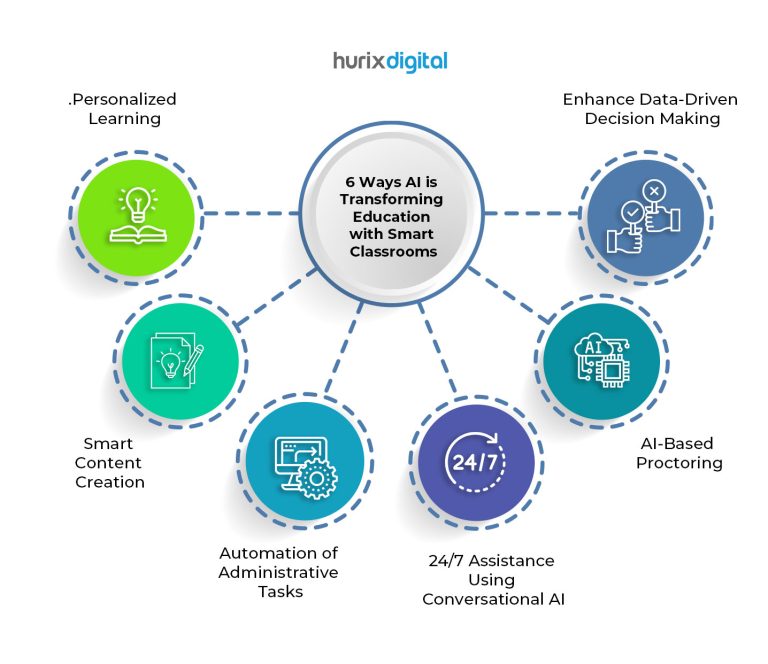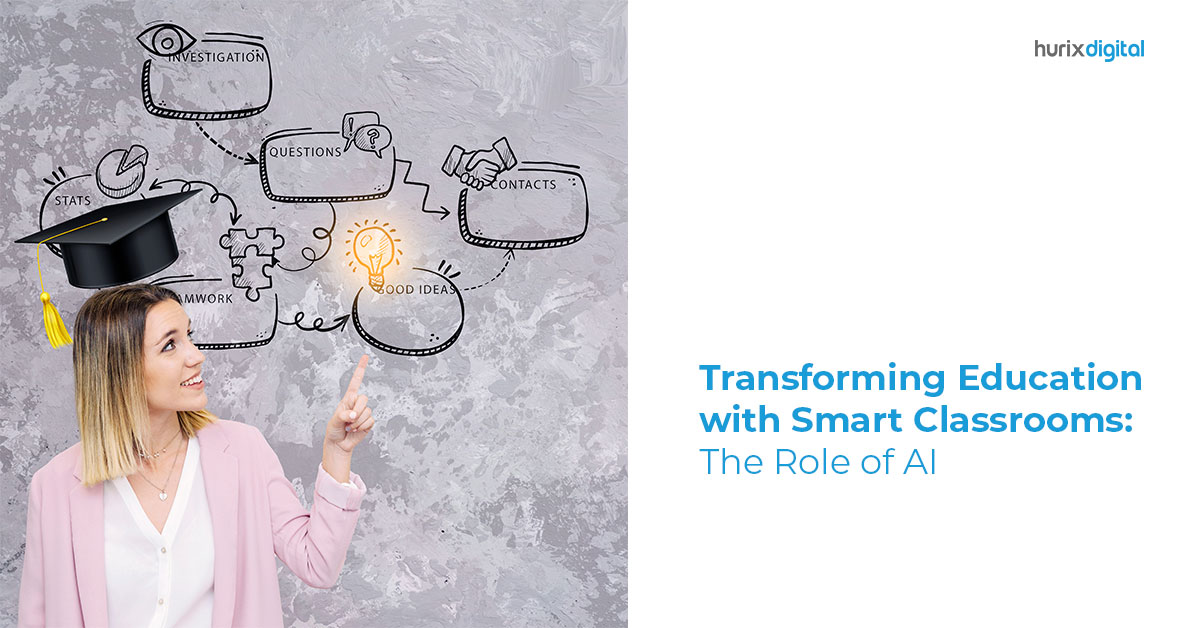Snehnath Neendoor
September 4, 2023
Transforming Education with Smart Classrooms: The Role of AI
Summary
This blog highlights how AI is revolutionizing the educational landscape with the advent of smart classrooms. These innovative environments provide personalized learning experiences, automate administrative tasks, and offer round-the-clock assistance through chatbots.
This may come as a surprise to most, but digitization is not the final frontier for education and eLearning. It is just the beginning of a new and modern educational institution.
An astounding 99.4% of higher educational institutions in the US mentioned they are already using AI in some form, and the role of Artificial Intelligence in education will only increase as we move towards a fully digital era.
As a result, the AI education market is predicted to be more than USD 20 billion by 2027 since it brings innumerable benefits to students and teachers.
In this blog, we will delve deeper into the transformational role of AI in education and understand unique ways of using AI in the classroom.

Table of Contents:
- What is a Smart Classroom?
- 6 Ways AI is Transforming Education with Smart Classrooms
- The Bottom Line
What is a Smart Classroom?
Before we dive deeper into the role of AI in education, let’s first understand what exactly makes a Smart Classroom. Although the definition of ‘Smart Classroom’ keeps getting updated with emerging trends in education technology and upgrades to educational standards, it is a technologically advanced learning environment that integrates digital tools and devices to enhance learning. These smart classrooms use practical tools like mobile learning, digital content platforms, augmented reality (AR), virtual reality (VR), wearable technologies, and more to make learning exciting, simplified, and accessible to all. Also Read: AI and Gamification: Enhancing Student Motivation and Achievement6 Ways AI is Transforming Education with Smart Classrooms
Now that we know what exactly makes a smart classroom let us understand what is the role of AI in education. Smart classrooms are ever-changing, making strides to include new technology and processes to make education inclusive and engaging. This is where AI in the classroom vs. traditional classroom makes a huge difference. Here is a look at the benefits of AI in the classroom and how AI-powered education is revolutionizing the way we teach and learn:
1.Personalized Learning
One of the most significant ways AI transforms education is through personalized learning experiences. AI algorithms can analyze extensive amounts of data, which includes student performance, learning styles, and preferences. This enables AI to tailor instruction to individual needs, making the learning experience customized to meet the special needs of students. This is especially beneficial to students with learning disabilities or needs special needs. AI can provide customized learning pathways, adaptive feedback, and targeted interventions by understanding each student’s weaknesses, strengths, and progress. AI-based adaptive learning systems have reduced students’ anxiety and are proven to improve learning performances. It also provided personalized and instant feedback, enabling students to assess their strengths and weakness and customize their learning experiences.2. Smart Content Creation
AI is revolutionizing not just the way curriculums are taught but also helping content creation in smart classrooms. With granular data points into student behavior and learning patterns, AI can help generate educational materials that align with specific learning objectives, including interactive videos, quizzes, and simulations. AI-powered tools can also curate and recommend relevant resources from diverse digital repositories, saving teachers valuable time searching for appropriate materials. Additionally, AI can assist in adapting content to different learning styles and accessibility requirements, ensuring inclusivity and catering to the diverse needs of students.3. Automation of Administrative Tasks
The teacher’s role is not just restricted in the classroom. There are several routine tasks that teachers need to do, such as grading assignments, generating progress reports, managing student schedules, designing curriculums, and more. By streamlining administrative tasks in education, AI can free up teachers to spend time on meaningful engagement with students. This helps reduce the administrative burden on teachers, allowing them to focus on providing personalized student support, aiding their professional development and learning ability.4. 24/7 Assistance Using Conversational AI
One of the remarkable ways AI is transforming education in smart classrooms is by providing 24/7 assistance using conversational AI. In traditional classrooms, students typically rely on limited teacher interaction during class hours. However, with the integration of conversational AI, students now have access to continuous support and guidance anytime and anywhere. Virtual assistants or chatbots can help students get instant responses to answer queries and provide instant feedback on assignments or projects. This enables students to get personalized guidance, access resources, and clarify doubts at their own pace, fostering interactive learning experiences even outside regular classroom hours.5. AI-Based Proctoring
With the rise of online and remote learning, ensuring academic integrity during assessments has become a significant concern. Although there are tools and mechanisms to do this, AI-based proctoring can help make monitoring even more efficient and scalable for online exams. By leveraging facial recognition, eye tracking, and audio analysis, AI can detect suspicious behavior and detect plagiarism or AI-generated content to help bring more integrity to education. It can even be used for grading, reducing teachers’ time spent on grading assignments or tests by 70%.6. Enhance Data-Driven Decision Making
The true power of AI in classrooms comes with the powerful insights and analytics that it can provide. In smart classrooms, AI algorithms collect and analyze vast amounts of data related to student performance, engagement, and learning patterns. By analyzing vast amounts of data faster and more accurately, AI helps provide specific data-driven insights, normally taking weeks or months if done manually. Not only does it help with individual student performance and grading, and it can also help teachers and educators identify gaps and challenges to evolve educational standards and curriculum accordingly. This data-driven approach empowers educators to make informed decisions and take proactive measures to improve instructional strategies and student outcomes. Also Read: How to Develop Courses for Virtual Classroom SolutionsThe Bottom Line
The role of AI may still be in its nascent stages, but it will have a profound impact in the near future. AI is revolutionizing learning through – personalized experiences, smart content creation, task automation, 24/7 chat assistance, and proctoring. As we move forward, the role of AI in education will continue to evolve and expand. It holds the potential to enhance adaptive learning further, advance educational research, and enable a more accessible learning experience. If you are looking for a partner to transform and take your digital learning experience to the next level, Hurix Digital’s Learning management systems can help you do that. For a state-of-the-art educational transformation, get in touch with Hurix. Frequently Asked Questions (FAQs) 1. How does AI transform education through personalized learning? A. AI analyzes student data to provide tailored instruction, adaptive feedback, and interventions, benefiting individual learning needs and improving performance. 2. How does AI contribute to smart content creation? A. AI generates educational materials aligned with learning objectives, including interactive videos, quizzes, and simulations, while also recommending relevant resources for diverse needs. 3. How does AI automate administrative tasks for teachers? A. AI streamlines tasks like grading, progress reports, and scheduling, allowing teachers to focus on meaningful student engagement and professional development. 4. What is the role of AI in proctoring for online exams? A. AI-based proctoring enhances academic integrity through facial recognition, eye tracking, and audio analysis, detecting suspicious behavior and plagiarism. 5. How does AI enhance data-driven decision making in education? A. AI collects and analyzes student performance data, providing educators with insights to make informed decisions, identify gaps, and improve instructional strategies.
Senior Vice President – Business Development
Over 25 years of experience in the edtech and workforce learning industry with strong skills in Business Development, Customer Relationship Management (CRM) and Strategy.









